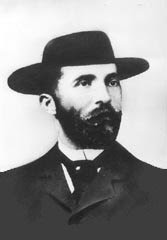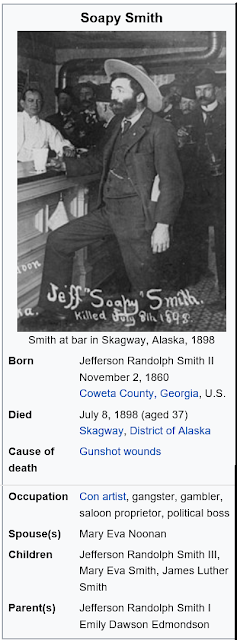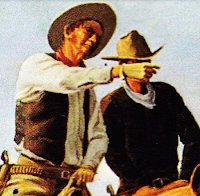Call him thief, outlaw, bad guy, con-man, or just plain scoundrel, but one thing for sure, Jefferson Randolf Smith II was one slick operator. He was able to control his gang members and corrupt politicians in the manner of a Mafia crime boss. Was he a reflection of Robin Hood as some had called him? Or was he more like a rendering of the forthcoming mob boss, Al Capone?
Let's take a closer look, and maybe you can decide.
It's a long way from Coweta County, Georgia to Skagway, Alaska, but that vast distance also covers the life and the story of Jefferson Randolph "Soapy" Smith II.
Smith was born into an affluent Coweta County family on November 2, 1860. His grandfather was a plantation owner and his father a lawyer. So, I'd say that J.R. did not lack for much in his youth... until the end of the Civil War, that is. Extremely hard times fell upon his folks, and they decided to move to Round Rock, Texas in an attempt to start over again. But the good times did not last long for them in Texas there either.
The death of Smith's mother laid heavy on his heart, and after witnessing so much violence in the territory, Smith himself also turned toward the outlaw life. He started as a rudimentary con man, but soon he had perfected his chicanery skills and went on to form a well-organized gang of thieves and front men. And it didn't take long for his reputation as a gang leader to earn him the title of “King of The Frontier Con Men.” Smith continued to build up his crime boss reputation and perfected many of his scams and swindles over the span of twenty two years.
Early on, he even got away with fooling his unsuspecting victims with the age-old shell game. He and his gang members also became experts at cheating in all the popular card games. Then there was the “soap” racket, where Smith would set up a folding showcase on a busy street corner and begin by wrapping money around selected cakes of soap. Then he would wrap plain paper around the cakes to hide the ones which had the money wrapped around them. Some had one dollar bills, while some of them even had a denomination as large as a $100 dollar bill.
Of course, his shills in the crowd had their own specially prepared cakes of soap which had money in them, and they would loudly proclaim their found treasure, which then enticed the suckers at the gathering to buy as many cakes of soap for a dollar as they had cash in their pockets in the hope that they too would be as lucky as the shills had pretended to be. Smith and his gang knew that they couldn't lose because by using slight of hand, Smith had already hidden away all the cakes of soap that he had wrapped with money. Thus, the nickname of “Soapy” caught on as he also became known by that tag all across the western states.
Smith made enough money from the soap scam to enable him to pay off most all of the corruptible lawmen, judges, and politicians in Texas. He now had enough power and resources to expand his operations into Denver and Creede, Colorado and on into Skagway, Alaska. And in 1888, Soapy opened up his own saloon and gambling hall in Denver. By then, he had so many judges and politicians in his pocket that he knew that he could get away with just about anything.
Also, Soapy's brother opened a cigar store that was nothing more than a front for crooked card games and other forms of gambling. Smith and his gang even operated fake lottery and stock exchange scams along with the sale of fake diamonds and expensive-looking counterfeit watches.
Living the life of a crime boss had its drawbacks however, as rival crime gangs made several attempts on Smith's life. But he managed to shoot some of his assailants and escape from the others. As to the “Robin Hood” title attributed to Smith, I suppose it was related to his known generous donations to many churches and charity groups, which in turn were able to help the poor in the area. But rather than having compassion for the poor, my guess would be that Smith had hoped that his donations would contribute to his popularity with the common folks and give him some clout in future political moves.
By 1892, anti-gambling laws in Denver and other towns forced Smith and his gang to move around from time to time. But with so many high-level officials on the take, he really had little to worry about in regards to the law. When the new governor, Davis Hansen Waite, was elected, he declared open warfare on all the corrupt politicians who had protected the Smith gang. When those officials refused to leave their offices, Waite called out the state militia to help oust them.
Rather than being shunned by the officials, Smith was commissioned as deputy sheriff, and he wasted no time to swing into action. He and his gang were able to heavily arm themselves with rifles and dynamite, and took up a position on top of the city hall's central tower, whereby a massive standoff ensued. When cooler heads prevailed, the governor withdrew the militia and the conflict was handled in the courts where Soapy was a prime witness. The Colorado Supreme Court ruled that the governor had authority to remove the officials, but reprimanded him for calling out the state militia.
The court then ordered all of Smith's illegal enterprises to be shut down. But because of his status as a commissioned deputy sheriff, Soapy merely made a series of fake arrests and then later turned his “prisoners” loose.
Probably, the only one of Smith's scams that failed was the time he tried to convince the president of Mexico that his country needed the services a foreign legion (comprised mostly of American outlaws) to protect his interests. The Mexican president did not buy Smith's fabrication about needing protection to be provided by a foreign legion. But undaunted after that minor setback, Smith focused his sights on the 1897 Alaskan gold rush.
He immediately went to work setting up his empire in Skagway by putting the local deputy U.S. Marshall on his payroll and recruiting other allies for his takeover of the town. A fake telegraph office was set up where money sent by wire was diverted to Smith's own enterprises. He also opened a string of saloons and gambling halls, and even had his men occupying the postilions of clergymen and newspaper reporters who would steer unsuspecting new arrivals in town to his own gang-operated establishments.
Once, a mob of 101 vigilantes threatened to boot Soapy and his gang out of the Skagway area, but he managed to put together his own “Law and Order Society,” which numbered an overwhelming 317 members, which forced the vigilantes to immediately back off. But this would not be Smith's last run-in with the vigilantes.
Apparently, Smith had a goal of expanding his subversive skills to the extent of using the U.S. Government to further his gains. In 1898, during the Spanish-American War, Soapy formed his own volunteer army that he called the “Skagway Military Company,” which somehow got approved by the U.S. War Department. Soapy was given the rank of captain, and recognized as its leader. But Soapy and his “army” never fought in the war. He merely used the clout of his military company to further strengthen his control over the town. But he did get to lead his little army in a 4th of July parade, and then sit in the grandstand next to the territorial governor and other distinguished officials.
But as fate would have it, Jefferson Randolf Smith II, died on July 8, 1898 while confronting Frank Reid, one of the vigilante guards who was blocking Smith's access to the Juneau Company wharf. In the ensuing gunfight, Smith was shot dead at the scene and Reid died 12 days later. But there is some conjecture that it was a bullet fired from one of the other guards at the scene that actually killed Smith.
Whether such an outlaw deserves it or not, the notoriety of Jefferson Randolf Smith II is celebrated in wakes held every July 8th all around the country. And Smith's grave and saloon are still recognized as very popular tourist attractions in Skagway, Alaska all year long.
Thus we have the legend of Jefferson Randolf Smith II, (November 2, 1860 – July 8, 1898).
Happy Trails,
Gary Miller
Editor's Note: It appears that there are several accounts pertaining to Soapy Smith's birth and death. The following is a timeline provided by geni.com:
Additional Reading:
- Jefferson Randolph Smith II, American 19th Century bad man
- Soapy Smith ("King of the Frontier Con Men")
- Jefferson Randolph Smith
- Soapy Smith
| ADVERTISEMENT |





















No comments:
Post a Comment
Thank you for your comment.